When most Nigerians think of North Africa, Egypt’s pyramids or Morocco’s medinas often come to mind. Yet, Algeria, Africa’s largest country, has some of the most impressive Roman ruins outside Italy. Cities like Timgad, Djemila, and Tipasa showcase the grandeur of the Roman Empire in Africa. These locations feature amphitheaters, temples, and mosaics that have been preserved for centuries.
For history enthusiasts and adventurous Nigerian travelers, a trip to Algeria’s Roman ruins presents a unique chance to dive into the past. However, since Algeria is less visited than its neighbors, it’s important to gather the right information about visas, flights, safety, and budgets. This guide provides all the details you need.
Why Visit Algeria’s Roman Ruins?
- Timgad (The Pompeii of Africa): A UNESCO site that features a grid-style Roman city.
- Djemila: Known for its mosaics, temples, and early Christian basilicas.
- Tipasa: A Roman port city with views of the sea, close to Algiers.
- Tiddis: Recognized for its distinctive hillside ruins.
- Authentic Experience: Fewer crowds in comparison to Rome or Tunisia.
Do Nigerians Need a Visa for Algeria?
Yes. Nigerians must apply for a tourist visa to visit Algeria.
Algeria Tourist Visa Requirements for Nigerians
- Nigerian Passport (valid for at least 6 months).
- Completed Algeria visa application form.
- Two recent passport photographs.
- Hotel booking confirmation or invitation letter.
- Proof of funds (bank statement for the last 3 to 6 months).
- Return flight reservation.
- Travel insurance (mandatory, covering Schengen and North Africa).
- Yellow Fever vaccination certificate.
Algeria Tourist Visa Fees
- Tourist Visa (Single Entry): $85 (₦127,500).
- Processing Time: 10 to 15 working days.
How to Apply for an Algeria Tourist Visa from Nigeria
Submit your application at the Algerian Embassy in Abuja:
- Book an appointment in advance via phone or email.
- Submit documents along with the visa fee.
- Wait for processing (usually takes 2 weeks).
- Collect your visa and get ready for travel.
Flights from Nigeria to Algeria
Algiers (Houari Boumediene Airport) serves as the main entry point.
Routes:
- Lagos to Algiers (via Air Algerie, Turkish Airlines, EgyptAir).
- Abuja to Algiers (via Addis Ababa with Ethiopian Airlines).
Flight Costs (Round Trip, Lagos to Algiers):
- Economy: $650 to $900 (₦975,000 to ₦1,350,000).
- Business: $1,800 and up (₦2,700,000 and above).
Flight time: 7 to 12 hours, depending on stopovers.
Getting Around Algeria
- Domestic Flights: Tassili Airlines connects Algiers with Constantine, Annaba, and Batna (near the ruins).
- Trains: Algeria has a rail system that links Algiers with Constantine.
- Buses: These are budget-friendly but involve longer journeys.
- Car Rentals: Costs range from $50 to $70 per day (₦75,000 to ₦105,000).
Accommodation in Algeria
- Budget Hotels: $30 to $60 (₦45,000 to ₦90,000).
- Mid-Range Hotels: $80 to $150 (₦120,000 to ₦225,000).
- Luxury Hotels: $250 to $500 (₦375,000 to ₦750,000).
Popular choices include:
- Sofitel Algiers (luxury).
- Hotel Aurassi (Algiers).
- Constantine Marriott Hotel (near Djemila).
- Local guesthouses in Batna (for Timgad).
Food and Dining in Algeria
Algeria’s cuisine mixes North African, Arab, and Mediterranean flavors.
Must-Try Foods:
- Couscous Royale: Algeria’s national dish.
- Chakhchoukha: Flatbread with meat stew.
- Merguez: Spicy lamb sausages.
- Makroud: Semolina pastries filled with dates.
Meal Costs:
- Street food: $2 to $5 (₦3,000 to ₦7,500).
- Local restaurants: $10 to $20 (₦15,000 to ₦30,000).
- High-end dining: $40 to $80 (₦60,000 to ₦120,000).
Key Roman Ruins to Visit
1. Timgad (UNESCO Site)
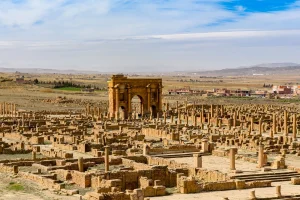
- Founded in AD 100 by Emperor Trajan.
- Features: Arch of Trajan, library ruins, amphitheater.
- Entry Fee: $5 (₦7,500).
2. Djemila
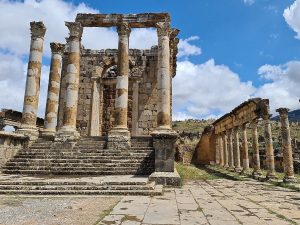
- Renowned for mosaics and basilicas.
- Entry Fee: $5 (₦7,500).
3. Tipasa
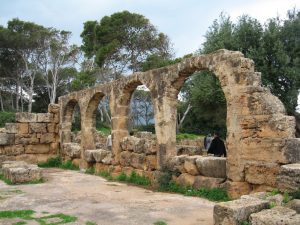
- A Roman port city with an amphitheater and basilica.
- Close to Algiers, offering sea views.
- Entry Fee: $5 (₦7,500).
4. Tiddis
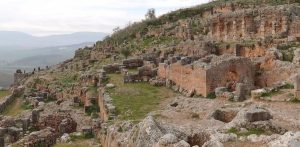
- Unique hillside ruins located near Constantine.
- Less crowded, making it great for photography.
- Entry Fee: $3 (₦4,500).
Best Time to Visit Algeria
- March to May (Spring): Ideal weather for sightseeing.
- September to November (Autumn): Warm and less crowded.
- June to August (Summer): Hot, so avoid desert areas.
- December to February (Winter): Cold in the mountains.
Safety Tips for Nigerians
- Algeria is generally safe, but some regions near Mali and Libya have restrictions. Stick to cities and tourist spots.
- Always carry a copy of your passport.
- Dress modestly, as Algeria is a Muslim country.
- French and Arabic are widely spoken, so learning basic phrases can help.
- Use official taxis or hotel transfers for safety.
10-Day Suggested Itinerary
Day 1: Fly from Lagos to Algiers and rest.
Day 2: Explore Algiers, visiting the Kasbah and Tipasa ruins.
Day 3: Fly or take the train to Constantine.
Day 4: Visit Djemila ruins.
Day 5: Tour the city of Constantine and its bridges.
Day 6: Take a day trip to Tiddis ruins.
Day 7: Travel to Batna.
Day 8: Spend a full day at Timgad ruins.
Day 9: Return to Algiers for shopping and relaxation.
Day 10: Fly back to Lagos.
Budget Estimate for 10 Days
- Visa Fee: ₦127,500.
- Flights (Nigeria to Algeria): ₦975,000 to ₦1,350,000.
- Domestic Travel: ₦180,000 to ₦300,000.
- Accommodation (9 nights): ₦405,000 to ₦1,350,000.
- Food: ₦180,000 to ₦300,000.
- Entrance Fees: ₦30,000.
- Miscellaneous: ₦120,000.
Total Estimate: ₦2,017,500 to ₦3,557,500.
For Nigerian history lovers, a journey to Algeria’s Roman ruins is an unforgettable experience. From the remarkably preserved Roman city of Timgad to the coastal ruins of Tipasa, Algeria provides a glimpse into Africa’s role in Roman history.
With careful planning, especially regarding visas and flights, you can explore a part of Africa that many tourists overlook. If you’ve traveled to Egypt or Morocco before, Algeria should be your next stop to discover ancient wonders.


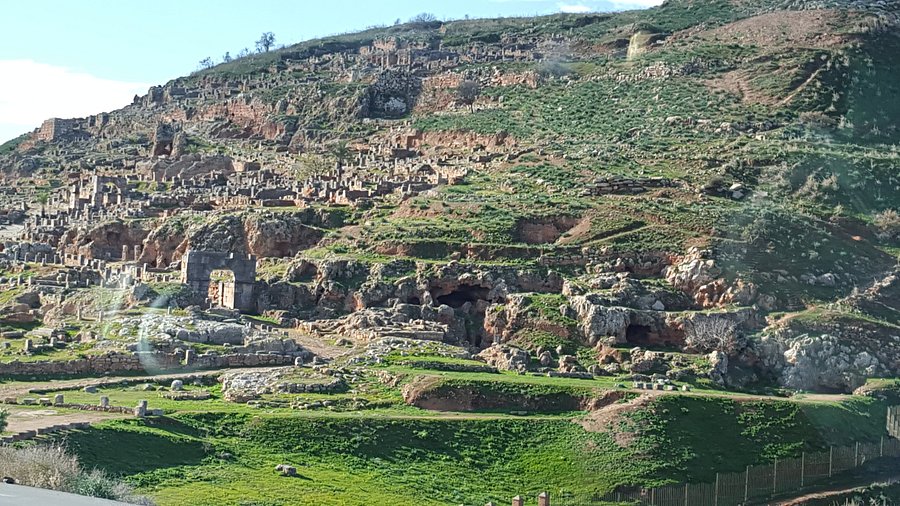

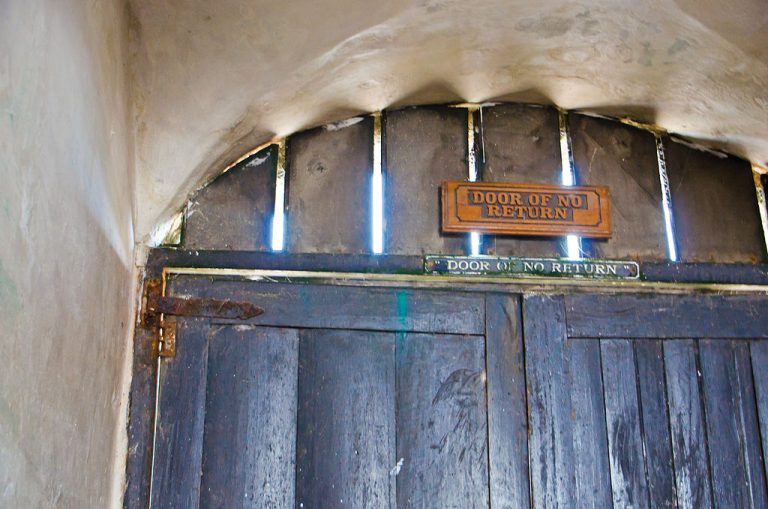
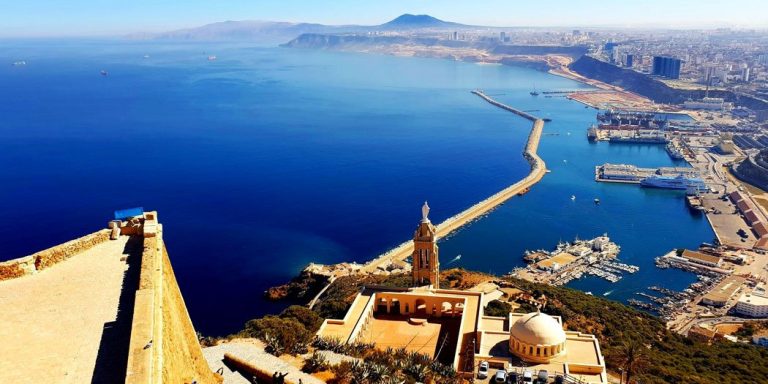
Leave a Comment